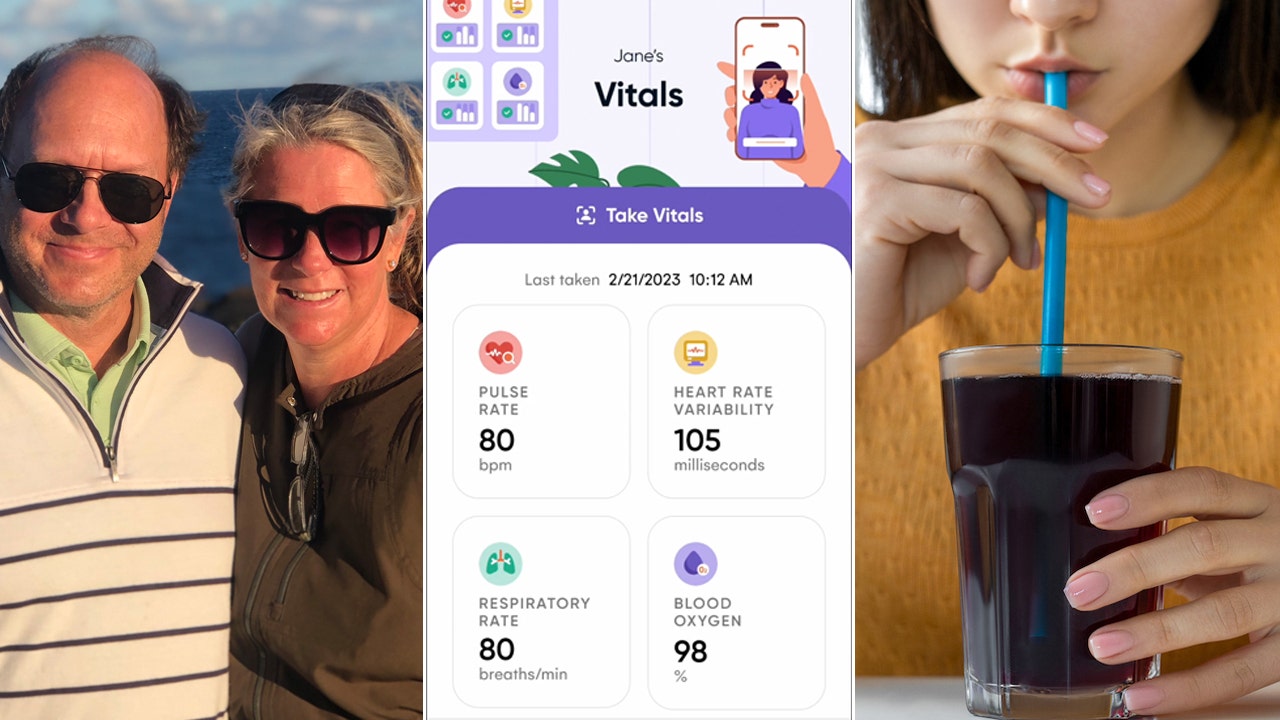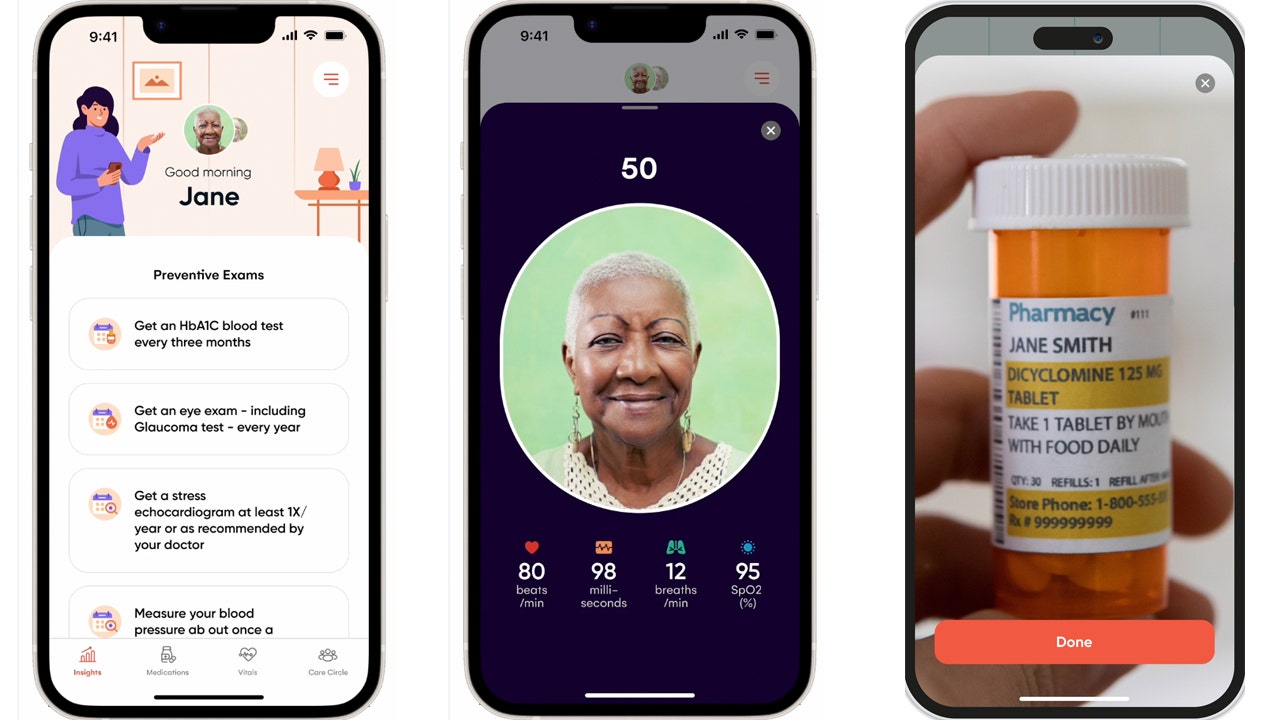Health
New Alzheimer’s drug ‘astounds’ patients, AI manages daily health and experts say aspartame is safe

Two Ohio patients who participated in the trials spoke to Fox News Digital about how Leqembi has impacted their Alzheimer’s journeys. On the left, patient Joan Murtaugh is pictured with her husband Larry Murtaugh; on right, John Domeck is shown with his wife Ann Domeck. (Joan & Larry Murtaugh/John & Ann Domeck)
‘NEW HOPE’ – Two Ohio patients share how the new Alzheimer’s drug has kept them “fully functional.” Continue reading…
EYE ON BRAIN HEALTH – Vision problems could point to dementia risk, study finds. Continue reading…
HIGH-TECH HEALTH – Here’s how a new app is helping seniors stay on top of their prescriptions and vitals. Continue reading…

“Together,” a free iPhone app built on generative AI, is designed to help aging adults and their caregivers manage patients’ medications and other health care tasks. (Together by Renee)
AI ON THE MAP – Find out which counties have the highest Alzheimer’s prevalence. Continue reading…
HEAD IN THE GAME – Ohio law requires coaches to get mental health training. Continue reading…
NOT SO SWEET – Industry experts defend aspartame after cancer risk warning. Continue reading…

A WHO committee has classified aspartame, the non-sugar, low-calorie sweetener, as “possibly carcinogenic to humans.” Others have another point of view. (iStock)
DIG INTO HEALTH – Gardening can boost mental and physical well-being, experts say. Continue reading…
‘DENTISTS’ DREAM’ – Experimental medicine in Japan could regrow teeth. Continue reading…
‘SLEEP DIVORCE’ – Some couples are retreating to separate beds. Continue reading…

A growing number of Americans are opting to leave the marital bed in exchange for a better night’s sleep elsewhere in the home — a scenario that some call a “sleep divorce.” Here’s what to know. (iStock)
FOLLOW FOX NEWS ON SOCIAL MEDIA
YouTube
SIGN UP FOR OUR NEWSLETTERS
Fox News First
Fox News Opinion
Fox News Lifestyle
Fox News Health
Fox News Autos
Fox News Entertainment (FOX411)
DOWNLOAD OUR APPS
Fox News
Fox Business
Fox Weather
Fox Sports
Tubi
WATCH FOX NEWS ONLINE
Fox News Go
STREAM FOX NATION
Fox Nation

Health
Early stroke symptoms, plus allergy prevention and foods that promote sleep

EVERY SECOND COUNTS – Jenna Gibson was just 39 when a stroke nearly killed her. Here, she shares her story to help raise awareness among young women. Continue reading…
‘PUBLIC HEALTH CONCERN’ – ADHD now affects 1 in 9 kids in the U.S., a new report reveals. Mental health experts discuss reasons for the spike and how families can help. Continue reading…
EAT WELL, SLEEP WELL – Want a better night’s sleep? Researchers suggest eating more of these types of foods. Continue reading…
Consuming more fruits and veggies helps to support the right amount of sleep, a new study has found. (iStock)
SOMETHING FISHY? – A certain supplement has been linked to an increased risk of cardiovascular events for some people. Researchers and doctors weigh in. Continue reading…
HELP FOR VETS – The U.S. Department of Veterans Affairs is bringing mobile medical care to homeless vets. Patients share how the initiative is changing their lives for the better. Continue reading…
RISK REDUCTION – Feeding peanut butter to babies — starting during infancy and continuing until age 5 — has been shown effective in reducing allergies into adolescence. Continue reading…

Feeding peanut butter to babies has shown to be effective in reducing allergies into adolescence, according to a new study. (iStock)
‘HUGE STIGMA’ – For World Schizophrenia Day, a mental health expert debunks some of the most common myths surrounding the disorder. Continue reading…
ILL-EQUIPPED – Half of American adults don’t think they can help in a medical crisis, a new poll reveals. Continue reading…
EYE OPENER – Several nurses share what they wish they’d known before entering the profession. Continue reading…

Left to right, Karie Ryan, Michele Acito, Katelynn Blackburn and Lisbeth Votruba shared insights into the nursing profession with Fox News Digital. Two other nurses shared thoughts as well. (iStock/Karie Ryan/Michele Acito/Katelynn Blackburn/Lisbeth Votruba)
FOLLOW FOX NEWS ON SOCIAL MEDIA
YouTube
SIGN UP FOR OUR NEWSLETTERS
Fox News First
Fox News Opinion
Fox News Lifestyle
Fox News Health
Fox News Autos
Fox News Entertainment (FOX411)
DOWNLOAD OUR APPS
Fox News
Fox Business
Fox Weather
Fox Sports
Tubi
WATCH FOX NEWS ONLINE
Fox News Go
STREAM FOX NATION
Fox Nation
Health
Ask a doctor: ‘Why am I hearing my heartbeat in my ears?’

You’ve likely felt your heart beating in your chest after strenuous activity — or have taken your pulse by placing your fingers on your wrist or neck.
A less common — and sometimes startling — sensation is to actually hear the “whooshing” sound of your heartbeat in your ears.
Fox News Digital reached out to two doctors to learn more about what causes this and whether it’s a cause for concern.
ANGER CAN INCREASE HEART ATTACK RISK, STUDY FINDS: ‘CHRONIC INSULT TO ARTERIES’
Hearing your heartbeat in your ears — also known by the Latin name “pulsatile tinnitus” — isn’t always a sign of a medical problem, but it could warrant a discussion with your physician, according to Frederick James Meine, M.D., an interventional cardiologist with Novant Health in Wilmington, North Carolina.
Hearing your heartbeat in your ears — also known by the Latin name “pulsatile tinnitus” — isn’t always a sign of a medical problem. Still, it could warrant a discussion with your physician. (iStock)
“Many people hear it at one time or another, especially when they are lying down on their side,” Meine told Fox News Digital.
What causes the condition?
Hearing your heartbeat can be related to ear issues such as wax buildup, fluid in the ear or other hearing issues, Meine said.
The most common cause is Eustachian tube dysfunction. This is usually due to allergies, according to Jesus Lizarzaburu, M.D., a family physician with TPMG Grafton Family Medicine in Yorktown, Virginia.
HALF OF AMERICANS NOT EQUIPPED TO PROVIDE LIFE-SAVING TREATMENT IN A CRISIS, POLL FINDS
“The Eustachian tube connects the middle ear to the back of your nose, and when it is blocked or doesn’t open and close properly, it can cause the sound of your heartbeat to be heard in your ears,” he told Fox News Digital.
Another culprit could be earwax buildup, which can also cause a seal in the ear canal that makes the heartbeat easier to hear, Lizarzaburu added.
Elevated blood pressure is another cause, though less common.

Hearing your heartbeat can be related to ear issues such as wax buildup, fluid in the ear or other hearing issues, a doctor said. (iStock)
On rare occasions, medications like non-steroidal anti-inflammatories (NSAIDs), antibiotics, diuretics, chemotherapy medications, aspirin, certain antidepressants, quinine and antivirals can cause tinnitus, a ringing in the ears that is in rhythm with the heart rate, noted Lizarzaburu.
“Extremely rare causes would be an aneurysm (a bulge in a blood vessel in the brain) or a vascular tumor, which is made up of a collection of blood vessels,” he added.
When to seek medical attention
A thorough physical exam, including a blood pressure check and an examination of the carotid arteries in the neck, is an important part of gauging overall cardiovascular health, Meine advised.
CLICK HERE TO SIGN UP FOR OUR HEALTH NEWSLETTER
“In addition, ruling out anemia or hyperthyroidism, both of which could cause increased blood flow and possibly contribute to pulsatile tinnitus, could be evaluated with simple lab tests,” he said.
If someone experiences the condition intermittently, it is likely less worrisome, the doctor noted.

A thorough physical exam, including a blood pressure check and an examination of the carotid arteries in the neck, is an important part of gauging overall cardiovascular health, a doctor advised. (iStock)
“However, if it is persistent or new-onset, we would perform a complete history and physical exam,” he said.
From a cardiovascular perspective, if someone is experiencing pulsatile tinnitus or hearing their heartbeat in their own ears, Meine said it’s important to rule out any potential cardiovascular issues.
The doctor would also make sure the patient does not have a blockage or narrowing of the neck arteries, which could contribute to louder heart sounds in the ears and head, he said.
“I do want to stress that most of us occasionally hear our heartbeats in our heads and ears, especially when our heart rate is increased during exercise,” Meine said.
For more Health articles, visit www.foxnews.com/health.
Health
FDA warns that nicotine-like chemicals in vapes may be more potent than nicotine

- Nicotine alternatives like 6-methyl nicotine in vapes may be more addictive than nicotine, according to the FDA.
- These synthetic substances are not regulated by U.S. tobacco and vaping laws that control traditional nicotine.
- Traditional nicotine is derived from tobacco leaves, while 6-methyl nicotine is synthesized in labs using chemicals.
Nicotine alternatives used in vapes being launched in the U.S. and abroad, such as 6-methyl nicotine, may be more potent and addictive than nicotine itself, though the scientific data remains incomplete, according to the U.S. Food and Drug Administration (FDA) and independent researchers.
The synthetic substances – which have a chemical structure similar to that of nicotine – are not subject to U.S. tobacco and vaping regulations that are designed to control traditional nicotine, a highly addictive drug.
That means manufacturers can sell vapes containing synthetic nicotine analogues such as 6-methyl nicotine in the United States without seeking authorization from the FDA – a process that can be costly, time-consuming and is often unsuccessful.
YOUNG VAPER WHO REQUIRED DOUBLE LUNG TRANSPLANT SHARES WARNINGS AS E-CIGARETTE SALES RISE
Big tobacco firms like Altria Group and British American Tobacco have already lost substantial U.S. sales to an influx of disposable vapes containing traditional nicotine that are being illegally sold without FDA authorization.
Various vapes, nicotine products and the new Spree Bar, which contains a chemical that mimics nicotine, line the shelves at Sultans’ Smoke in Arvada, Colorado, on May 21, 2024. (REUTERS/Kevin Mohatt/ File Photo)
Altria, the maker of Marlboro cigarettes in the United States, highlighted the emerging use of 6-methyl nicotine in vapes and other smoking alternatives in a May 9 letter to the FDA, according to a copy of the correspondence posted on its website.
It urged the agency to evaluate the compounds and establish what authority it had over them, warning they posed a “new threat” to regulation of the sector.
“The introduction and growth of chemicals intended to imitate the effects of nicotine, if left unchecked, could present unknown risks to U.S. consumers and undermine FDA’s authority,” the letter said.
SMOKING CIGARETTES CAN DESTROY LUNGS, BUT SHOCKING NEW STUDY REVEALS WHY VAPING CAN HARM THE HEART
It cited SPREE BAR, a vape launched in October by Charlie’s Holdings Inc that uses 6-methyl nicotine.
The FDA does not comment on its correspondence with individual firms.
In response to Reuters’ questions about 6-methyl nicotine and other nicotine alternatives, the FDA said in a statement: “Although more research is needed, some emerging data show these nicotine analogs may be more potent than nicotine – which is already highly addictive, can alter adolescent brain development and have long-term effects on youth’s attention, learning and memory.”
Traditional nicotine found in many vapes and pouches is extracted from tobacco leaves. 6-methyl nicotine, in contrast, is made entirely in the lab using chemicals.
The FDA said it was considering the use of such synthetic compounds from an “agency-wide perspective” and would use all of its resources to protect youth from products that may harm their health. As well as tobacco products, the FDA also regulates drugs, foods, cosmetics and more to ensure safety and efficacy.
“The FDA is a data-driven agency, and we’re in the process of reviewing the available data to inform potential actions in this space,” it said in response to Reuters’ questions.
Three academic researchers told the news agency that current studies of 6-methyl nicotine are too limited to draw definite conclusions on the health impact or to what degree it is addictive.
Imad Damaj, a professor in the Department of Pharmacology and Toxicology at Virginia Commonwealth University, said his research showed 6-methyl nicotine may be more potent than nicotine, but more extensive tests were needed to say what impact it has on humans.
The limitations of existing research included that some papers were industry funded, while others focused on the short-term impact on animals or cells and were insufficient to understand 6-methyl nicotine’s effects on human bodies, the researchers said.
Charlie’s Holdings calls the 6-methyl nicotine solution used in SPREE BAR Metatine. SPREE BAR’s website says Metatine “may have a toxicity profile similar to nicotine”.
SPREE BAR promises users 6,000 puffs from each device and offers fruity flavors including “blue razz ice” and “creamy melon”, according to its website.
The FDA has yet to approve any flavored vape using traditional nicotine for sale in the United States, saying companies have not been able to show that the health benefits they offer to smokers outweigh the known risks to young people, who may be more attracted by the flavors.
Charlie’s Holdings co-founder Ryan Stump told Reuters that the company only targets adults, adding that flavors played an important role in its mission to help smokers quit cigarettes.
Stump said Charlie’s Holdings respects and abides by laws in every market where it operates. He acknowledged that more research is needed on 6-methyl nicotine, adding that the company dilutes it in its products.
US SCHOOLS INVEST MILLIONS IN SURVEILLANCE TECHNOLOGY TO COMBAT TEEN VAPING EPIDEMIC
TARGETING INTERNATIONAL MARKETS
Anes Saleh sells SPREE BAR in his vape shop in Denver, Colorado, called Sultan Smoke. He said he has some customers who only buy Spree Bar instead of a nicotine vape and he hasn’t had any negative feedback on the product.
“The only… protest I would hear about people not wanting to try this is that they don’t know what Metatine is or does,” he said.
Stump said that Charlie’s Holdings is working on new varieties of SPREE BAR and new products using 6-methyl nicotine. It will launch SPREE BAR internationally this year. He declined to say where.
The company buys the 6-methyl nicotine solution used in SPREE BAR from another U.S. firm, Novel Compounds, according to Novel Compounds’ founder Samuel Benaim.
Novel Compounds imports 6-methyl nicotine from overseas and alters it to make it easier for manufacturers like Charlie’s Holdings to use in their products. It sells this solution under the trade name imotine.
Tests commissioned by Novel Compounds have found 6-methyl nicotine to be no more harmful than nicotine, Benaim said. But he also said that more research was needed into the chemical.
Benaim added that Novel Compounds had received legal advice that its product is not classified as a tobacco product or drug in the United States. The company is committed to legal compliance, he said.
MORE POTENT THAN NICOTINE?
Sven Jordt, a professor at Duke University, who has authored papers on products like SPREE BAR, said 6-methyl nicotine could me more addictive and toxic than its traditional cousin.
“Do we want to have such a chemical as a recreational product, available to anyone?,” he asked. “That’s really questionable.”
Neither Jordt nor Damaj – the professor at Virginia Commonwealth University – have received funding from tobacco or vape makers.
As well as the United States, Novel Compounds also sells its 6-methyl nicotine solution around the world, including in the United Kingdom, Indonesia, India and Japan.
Another company, Aroma King, sells 6-methyl nicotine in the United Kingdom in pouches, which users insert under the lip to get a buzz. The pouches are sold in cans emblazoned with graphics of gorillas in suits and sunglasses.
It said in a February blog post that its 6-methyl nicotine products were “less toxic”, “less harmful”, and “less addictive” than regular nicotine products.
In a statement to Reuters, Aroma King cited existing research, its own toxicology and other tests and its supplier, which classifies 6-methyl nicotine as less toxic under the European Union’s Classification, Labelling and Packaging of Substances and Mixtures (CLP) Regulation.
Aroma King said 6-methyl nicotine was self-classified by its supplier. It declined to say who supplies it with the chemical.
Four Chinese companies hold patents in China related to the production of 6-methyl nicotine, including Zinwi Biotech, a company that makes the liquid used in vapes.
Zinwi Biotech confirmed it is researching 6-methyl nicotine but did not answer further questions, including on whether it has sold any 6-methyl nicotine so far. Reuters was unable to find contact details for the other firms.
-

 Culture1 week ago
Culture1 week agoFrom Dairy Daddies to Trash Pandas: How branding creates fans for lower-league baseball teams
-

 World1 week ago
World1 week agoPanic in Bishkek: Why were Pakistani students attacked in Kyrgyzstan?
-

 News1 week ago
News1 week agoRed Lobster files for bankruptcy after missteps including all-you-can-eat shrimp
-

 News1 week ago
News1 week agoThe states where abortion is on the ballot in November : Consider This from NPR
-

 Politics1 week ago
Politics1 week agoMichael Cohen swore he had nothing derogatory on Trump, his ex-lawyer says – another lie – as testimony ends
-

 Movie Reviews1 week ago
Movie Reviews1 week agoMai Movie Review: Emotionally powerful lead performances in this sensitive and heart-breaking romantic film
-

 Politics1 week ago
Politics1 week agoAnti-Israel agitators interrupt Blinken Senate testimony, hauled out by Capitol police
-

 News1 week ago
News1 week agoCity of Kyle falls short of ‘Kyle’ world record














